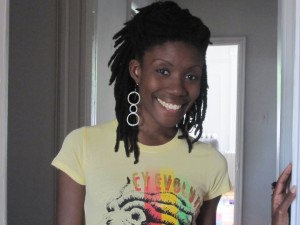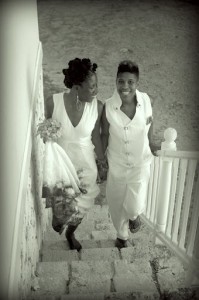The impact of Living out Loud as a Gay Jamaican
By Nicole Y. Dennis-Benn
It has been a week since the first story broke about my marriage to my beautiful wife, Emma Benn, at Silver Sands Villa in Duncans Trelawney, a parish in Jamaica. In one week, our lives have changed. It started with an article in the Jamaica Gleaner, “Lesbian Nuptials at Silver Sands.” When and how this information was leaked, we are still uncertain. But this article immediately garnered attention, enough to overwhelm the comments section of the online article: “Could it be true? Did two women really get married on the island known to refute same-sex unions? What an ungodly occurrence! They should be charged! The Villa should be fined!” The questions and admonishments stirred like a typhoon in the middle of the ocean. What was meant to be a private, intimate ceremony with family and friends, as a re-enactment of our legal marriage a month before in New York where same-sex marriage was recently legalized, became an overnight sensation in Jamaica. We made history.
“It is illegal … in Jamaica,” a pastor was quoted saying. “Marriage is not a union between any two people; it must be between a man and a woman. This kind of thing is not the norm and is not something you would expect to see in a Christian country.”
But in the midst of the reactions following the breaking news, there was something bigger; something my wife and I happened to be caught in the middle of by chance. It wasn’t our wedding, it was the timing. For in recent months Jamaica had been engaged in dialogue about homosexuality when Portia Simpson-Miller, Jamaica’s current Prime Minister, shocked the nation by saying she will hire a competent person to serve in her cabinet regardless of their sexual orientation. For a Jamaican Prime Minister to make such a statement in a public debate is an anomaly in a culture so rigid about same-sex unions. After this statement, Simpson-Miller won the election by a landslide. This was followed by President Obama on May 9, 2012, when he publicly expressed that he supports same sex marriage. The National Association for the Advancement of Colored People (NAACP), a very prominent civil rights organization in the US, followed suit when they too expressed their support of same-sex marriage.
By the comments I’ve received in response to the Jamaica Gleaner article and the article in Ebony Magazine, I realize that our wedding has encouraged positive discourse about homosexuality and same sex marriages throughout the African Diaspora. I’ve gotten messages from people all over the world—people living in West Africa, South Africa, Singapore, Quebec, Jamaica, and the United States. What my wife and I did was spark the flame. The gasoline was already there. And so was the match. All we did was express our love before family and friends in a place I still call home. A place known for its homophobia, yet still embracing us. If we did not have the support of the venue, many of its staff and villa owners, and the local community, our wedding would have been impossible. We may not have been the first to do this, but the attention resonated from the social movement that was already in effect. A social movement that was already orchestrated by the higher-ups that eventually trickled down to two women having their wedding in Jamaica—one Jamaican and the other one African American. Two women. Two women of the African Diaspora. From two countries in active dialogue about the issue of same-sex unions. Two women. One love. And an act of courage.
Jamaica was ready. America was ready. The world was already poised, watching, waiting.
But what touched me most were the messages of support from gay and lesbian individuals living in Jamaica. Many have expressed how inspired they were by our courage to do such a thing. A nineteen year old girl wrote that she was on the verge of giving up on life after a long internal battle with her sexuality. But after reading the article about us in the Jamaica Gleaner, she was able to see for the first time that there is a bright side at the end of the tunnel. After reflecting on comments like these, Emma and I realized that we were now held in high regard by those who saw us as revolutionaries. We realize that our story is bigger than us.
I recalled how alone I felt during my coming out process in high school and how important it was for me to see other lesbians as role models or even to see representations of us. Like that nineteen year old girl, I used to be under the dark and desolate impression that I was the only lesbian in Jamaica; that I was the only person walking around with supposedly “unnatural” feelings for other women. But during my freshman year of college I met another Jamaican woman, a Jamaican-born poet by the name of Staceyann Chin who captivated me by her fearlessness as an out lesbian.
Now, Emma and I are proud that our courage could give a voice to so many who truly love their culture and homeland, but who, marginalized, ostracized, and often living in fear, never feel that love reciprocated. Our story is not a lesbian story or a Jamaican story, but a story of love between two people that is so amazing, we just could not keep it hidden from the world. We know that we have not started this movement, but we are determined to give it the extra push it so desperately needs.
________________________________
 Nicole Y. Dennis-Benn received her MFA in Fiction from Sarah Lawrence College. Her work addresses gender, sexuality, religion, and the Caribbean immigrant experience. Her forthcoming novel, Run Free, tells the story of a transgendered son of Jamaican immigrants. Nicole currently lives with her wife in Brooklyn, NY.
Nicole Y. Dennis-Benn received her MFA in Fiction from Sarah Lawrence College. Her work addresses gender, sexuality, religion, and the Caribbean immigrant experience. Her forthcoming novel, Run Free, tells the story of a transgendered son of Jamaican immigrants. Nicole currently lives with her wife in Brooklyn, NY.





32 Comments